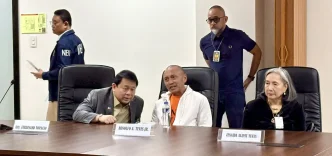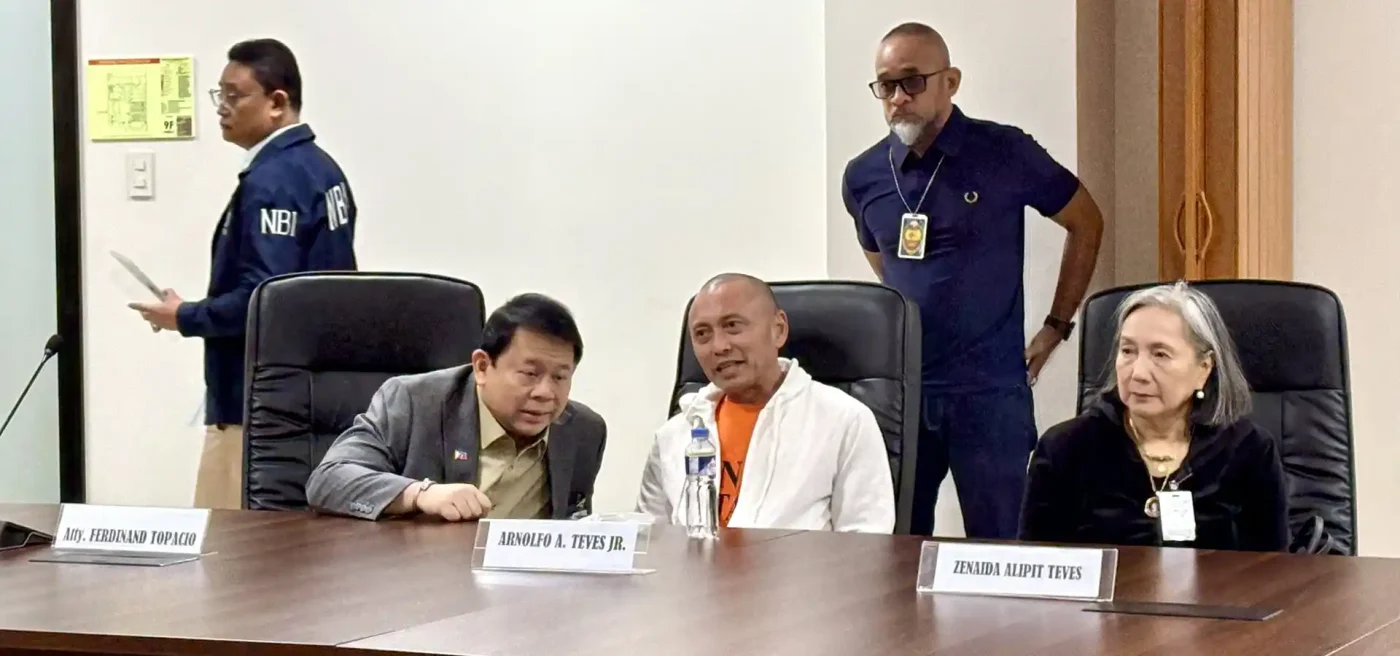Expelled Negros Oriental 3rd District Representative Arnolfo Teves Jr. has returned to the Philippines under tight security to face multiple charges of murder and frustrated murder, marking a significant development in a high-profile case tied to the brutal killing of Negros Oriental Governor Roel Degamo and 12 others in March 2023. Teves boarded a Philippine Air Force plane in Timor-Leste on Thursday, following his deportation by Timorese authorities who labeled him a “threat to national security.”
A Long-Awaited Return
Teves’ repatriation ends months of legal and diplomatic wrangling between the Philippines and Timor-Leste, where the former lawmaker had sought refuge after fleeing the country amid allegations of orchestrating the Pamplona massacre, a deadly attack that shocked the nation. According to a live broadcast by Timorese outlet SMNews, Teves boarded the military aircraft shortly after 1 p.m. local time, with the plane departing Dili at 2:40 p.m. on Thursday. His arrival in the Philippines is expected to reignite public and political scrutiny over accountability for political violence in the region.
Justice Secretary Jesus Crispin Remulla confirmed Teves was in Philippine custody moments after the plane took off. “He’s already in Philippine custody, the custody of our government” said Remulla during a brief interview. “We will bring him home so he can face all the charges against him regarding the murder of Governor Roel Degamo and 12 other people who were killed in March 2023” he added. The Department of Justice (DOJ) mobilized a specialized team to facilitate the transfer, underscoring the case’s priority for the administration of President Ferdinand Marcos Jr.
Charges and Context of the Pamplona Massacre
Teves faces multiple counts of murder and frustrated murder under the Revised Penal Code, linked directly to the Pamplona massacre on March 4, 2023. The attack, which targeted Governor Degamo at his residence in Pamplona town, resulted in the deaths of 13 individuals, including civilians, and left several others injured. Authorities have described the incident as a politically motivated assassination, with Teves named as the alleged mastermind. While investigations continue, the case has exposed deep-seated issues of political rivalries and violence in Negros Oriental, a province long plagued by such conflicts.
The former congressman’s expulsion from the House of Representatives in August 2023, on grounds of disorderly behavior and prolonged unauthorized absence, further intensified calls for his return to face justice. Teves had left the Philippines shortly after the killings, prompting the issuance of arrest warrants and an Interpol red notice. His eventual arrest by Timor-Leste immigration authorities on Tuesday evening at his residence in Dili marked a turning point, culminating in the Timorese government’s decision to deport him.
Deportation and Diplomatic Efforts
The decision by Timor-Leste to deport Teves came after sustained diplomatic efforts by the Philippine government, which argued that his presence posed risks to both nations’ security. Timorese authorities officially cited Teves as a “threat to national security,” though specific details behind this designation remain undisclosed. The deportation process, while swift, required coordination between the DOJ, the Department of Foreign Affairs, and Timorese officials to ensure compliance with international extradition protocols.
Remulla’s statements suggest a meticulous plan for Teves’ handling upon arrival. The plane is expected to land at Villamor Air Base in Pasay City, where Teves will undergo a routine health check-up at a designated hospital before completing biometric procedures. He is slated to appear before the court handling his murder cases for arraignment, a critical step in the legal process that could determine the trajectory of the prosecution. “We will make sure he’s safe” said Remulla, addressing concerns about Teves’ security amid the high-profile nature of the case.
Legal and Security Arrangements
The DOJ has prepared a facility under the National Bureau of Investigation (NBI) to hold Teves during the legal proceedings, though exact details of the location remain confidential for security reasons. Given the gravity of the charges and the potential for retaliation or public unrest, authorities are taking no chances. The Pamplona massacre not only claimed lives but also deepened public mistrust in political institutions in Negros Oriental, where rivalries between powerful families have historically fueled violence.
Legal experts suggest that Teves’ arraignment will test the strength of the prosecution’s case, which relies heavily on witness testimonies and circumstantial evidence linking him to the planning and funding of the attack. If convicted on all counts, Teves could face life imprisonment without parole under Philippine law for each murder charge. However, his legal team is expected to challenge the allegations, potentially arguing procedural irregularities or political persecution, claims that have surfaced intermittently since his flight from the country.
Political Implications and Public Sentiment
Beyond the courtroom, Teves’ return carries significant political weight. The killing of Governor Degamo, a reformist figure in Negros Oriental, galvanized calls for stronger measures against political violence, a persistent issue in the Philippines, particularly during election periods. The massacre occurred just months after the 2022 national elections, raising questions about the effectiveness of security protocols for local officials and the broader culture of impunity in some regions.
Public reaction to Teves’ deportation has been mixed. In Negros Oriental, families of the victims have expressed cautious optimism that justice may finally be served, though many remain skeptical about the influence of political dynasties in shaping legal outcomes. On social media platforms like X, sentiments range from demands for swift conviction to concerns over whether Teves will receive a fair trial given the intense public and media scrutiny surrounding the case.
Broader Challenges of Political Violence
The Teves case is emblematic of deeper systemic challenges in the Philippines, where political violence often intersects with family feuds, economic interests, and weak governance structures at the local level. Negros Oriental, with its history of land disputes and electoral rivalries, has been a hotspot for such conflicts, often leaving civilians caught in the crossfire. The Pamplona massacre, in particular, drew international attention to the risks faced by public officials in the country, prompting discussions on the need for enhanced protection mechanisms and stricter enforcement of gun control laws.
Analysts argue that while Teves’ return is a step toward accountability, it is unlikely to dismantle the underlying networks that enable such violence. “This is a high-profile case, but it’s just the tip of the iceberg” said Maria Lopez, a political analyst based in Manila. “The government must address the root causes—poverty, lack of education, and the concentration of power in a few hands—if it wants to prevent future tragedies” she added. Without broader reforms, the cycle of retribution and impunity risks perpetuating instability in vulnerable regions like Negros Oriental.
International and Regional Context
Teves’ deportation also highlights the role of international cooperation in addressing transnational crime and fugitives. Timor-Leste, a small nation with limited resources, faced diplomatic pressure to act on Teves’ case, balancing its own security concerns with obligations under international law. The successful repatriation could set a precedent for similar cases in Southeast Asia, where fugitives often exploit porous borders and varying legal standards to evade justice.
For the Philippines, the case underscores the importance of strengthening bilateral ties with neighboring countries to combat crime and ensure accountability. The government’s persistence in pursuing Teves, despite logistical and legal hurdles, sends a message that fleeing abroad is not a viable escape from prosecution. However, it also raises questions about the capacity of local judicial systems to handle politically charged cases without external interference or internal bias.
Looking Ahead
As Arnolfo Teves Jr. prepares to face the courts, the eyes of the nation—and particularly the people of Negros Oriental—remain fixed on the outcome. Will this case mark a turning point in the fight against political violence, or will it become another chapter in a long history of unresolved grievances? The answers may lie not just in the courtroom, but in the willingness of leaders to confront the structural issues that enable such acts. For now, Teves’ return offers a glimmer of hope for justice, even as the wounds of the Pamplona massacre remain fresh in the collective memory.















